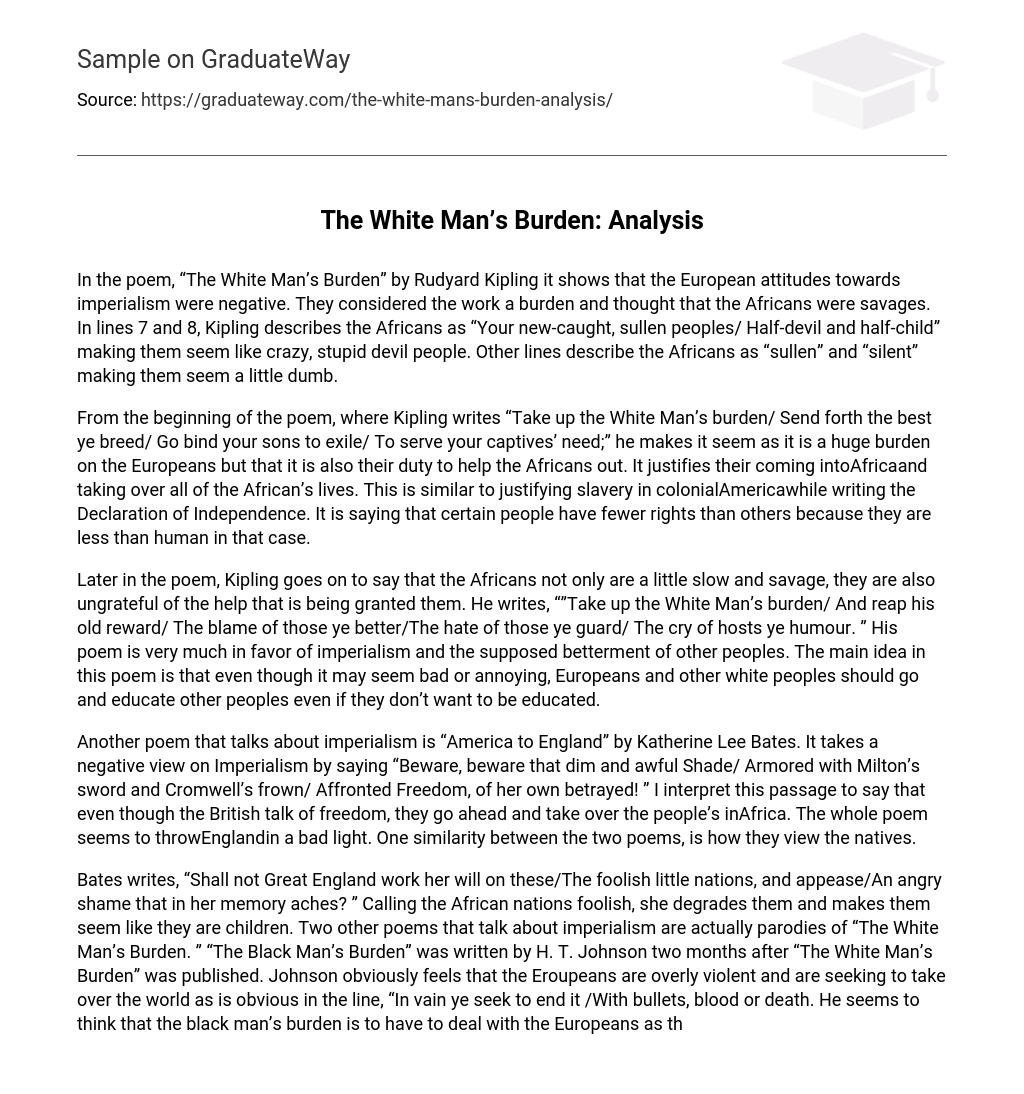In the poem, “The White Man’s Burden” by Rudyard Kipling it shows that the European attitudes towards imperialism were negative. They considered the work a burden and thought that the Africans were savages. In lines 7 and 8, Kipling describes the Africans as “Your new-caught, sullen peoples/ Half-devil and half-child” making them seem like crazy, stupid devil people. Other lines describe the Africans as “sullen” and “silent” making them seem a little dumb.
From the beginning of the poem, where Kipling writes “Take up the White Man’s burden/ Send forth the best ye breed/ Go bind your sons to exile/ To serve your captives’ need;” he makes it seem as it is a huge burden on the Europeans but that it is also their duty to help the Africans out. It justifies their coming intoAfricaand taking over all of the African’s lives. This is similar to justifying slavery in colonialAmericawhile writing the Declaration of Independence. It is saying that certain people have fewer rights than others because they are less than human in that case.
Later in the poem, Kipling goes on to say that the Africans not only are a little slow and savage, they are also ungrateful of the help that is being granted them. He writes, “”Take up the White Man’s burden/ And reap his old reward/ The blame of those ye better/The hate of those ye guard/ The cry of hosts ye humour. ” His poem is very much in favor of imperialism and the supposed betterment of other peoples. The main idea in this poem is that even though it may seem bad or annoying, Europeans and other white peoples should go and educate other peoples even if they don’t want to be educated.
Another poem that talks about imperialism is “America to England” by Katherine Lee Bates. It takes a negative view on Imperialism by saying “Beware, beware that dim and awful Shade/ Armored with Milton’s sword and Cromwell’s frown/ Affronted Freedom, of her own betrayed! ” I interpret this passage to say that even though the British talk of freedom, they go ahead and take over the people’s inAfrica. The whole poem seems to throwEnglandin a bad light. One similarity between the two poems, is how they view the natives.
Bates writes, “Shall not Great England work her will on these/The foolish little nations, and appease/An angry shame that in her memory aches? ” Calling the African nations foolish, she degrades them and makes them seem like they are children. Two other poems that talk about imperialism are actually parodies of “The White Man’s Burden. ” “The Black Man’s Burden” was written by H. T. Johnson two months after “The White Man’s Burden” was published. Johnson obviously feels that the Eroupeans are overly violent and are seeking to take over the world as is obvious in the line, “In vain ye seek to end it /With bullets, blood or death. He seems to think that the black man’s burden is to have to deal with the Europeans as they try to conquer them. This poem takes a very negative view on imperialism. Another poem, “The Poor Man’s Burden,” was written by George McNeill a month after “The White Man’s Burden was published. McNeill says that the poor people in a community will not benefit from imperialism as the richer peoples may. He says that the poor people are pretty much like slaves. He is highly against imperialism because he believes that it does not allow people the freedom that they deserve.





